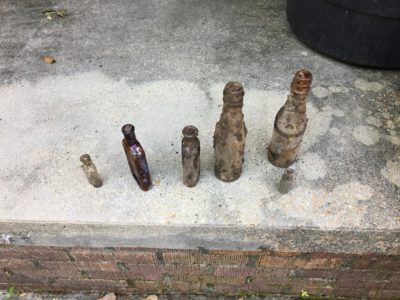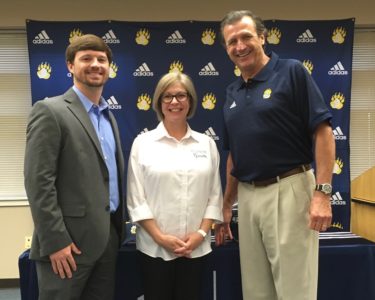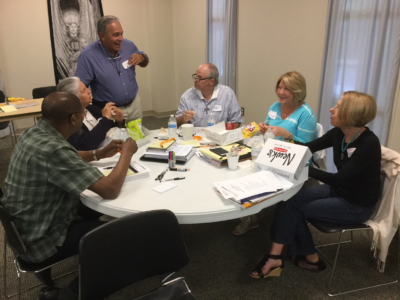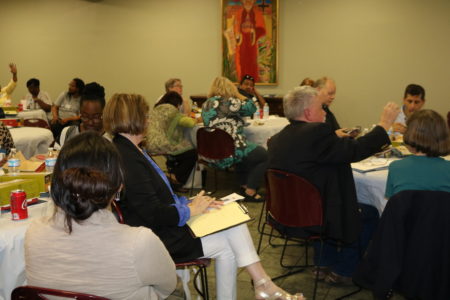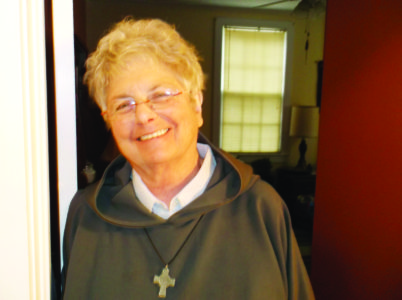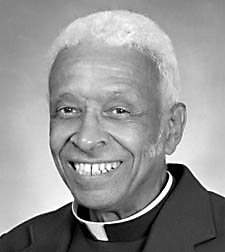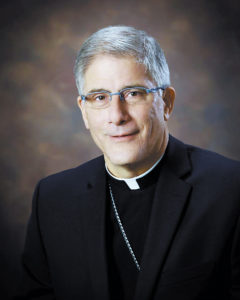
Obispo Joseph Kopacz
Por Obispo Joseph Kopacz
Homilia de la ordenación del Diácono Nick Adam y Deacon Aaron Williams el 31 de mayo de 2018, la Visitación
“Hijos mios ustedes van a ser ahora avanzados a la orden del presbiterado. Deben aplicar sus energías en la tarea de enseñar en el nombre de Cristo, el jefe maestro. Mediten sobre la ley de Dios: crean lo que lean, enseñen lo que creen, y pongan en práctica lo que enseñan. Dejen que la doctrina que enseñan sea alimento puro para el pueblo de Dios. De la misma manera deben llevar a cabo su misión de santificar en el poder de Cristo. En el memorial de la muerte y resurrección del Señor, hagan todos los esfuerzos posibles para morir al pecado y caminar en la vida nueva de Cristo. Cuando bauticen traerán a mujeres y hombres al pueblo de Dios. En el sacramento de la penitencia perdonarán los pecados en nombre de Cristo y de la Iglesia. Con el aceite santo aliviarán y consolarán a los enfermos. Orecer alabanza y gracias a Dios durante todo el día, orando, no sólo por el pueblo de Dios, sino por el mundo entero. Recuerden siempre el ejemplo del Buen Pastor, que no vino para ser servido, sino para servir y para buscar y rescatar a quienes estaban perdidos”.
* Desde el rito de la ordenación
Permítanos acompañar a María e Isabel mientras se encuentran la una a la otra en uno de los momentos más alegres en toda la Escritura. Las generaciones se encuentran cuando una mujer de edad bendice a las más jóvenes.
Decir que están entusiasmadas está muy lejos de la realidad. Son dos mujeres que el Espíritu Santo ha abrazado, y están en fuego por Dios. Han aceptado el plan de Dios en sus vidas y están liberadas. María está con todos aquellos que son llamados cuando están muy joven y Elizabeth con los llamados después que han pasado su juventud. Cantan hoy por todas los grandes mujeres olvidadas que han convertido a la eternidad a tiempo.
En este drama divino de salvación, pasamos a los diáconos Aaron y Nick que han aceptado la invitación del Señor Jesús a ser discípulos, amigos y sacerdotes de Jesucristo, sacerdotes de la Nueva Alianza para la Diócesis de Jackson en nuestros días. Como María, su “sí” a la llamada del Señor fue moldeada en sus familias a lo largo de muchos años, de muchas maneras ordinarias. Le agradecemos a sus familias por construir fuertes cimientos sobre los que construir. Como María e Isabel, han adaptado sus vidas con el plan de Dios para ellos, y poniendo un poco de nerviosismo aparte, proclaman la grandeza de Dios, y se regocijan en Dios su Salvador. Llamados por su nombre hemos afirmado su rotundo sí a estar aquí. Están deseoso de servir en la Iglesia para la salvación de todos. Su deseo de entrar en acción es como el caballo, Justificar, que ganó el Derby de Kentucky y el Preakness y pronto va a salir fuera de la puerta en el Belmont. El entusiasmo, la energía y el celo son los signos de una auténtica vocación, haciendo de la vida algo hermoso por Dios, como la madre Teresa solía decir.
Pero como sabemos, no siempre es 75 grados y humedad baja. A veces el índice de calor es más de 100, y sentimos el peso de nuestras responsabilidades. Nuestra primera lectura es una de las muchas que hay en las Escrituras que narra la historia del Antiguo Testamento sin ilusión. Moisés estaba al borde con los Israelitas deambulando en el insoportable calor del desierto sintiendo la enorme carga de sus responsabilidades. “¿Concebí a estas personas que me diste, o las parí? Son demasiado pesadas para mí para cargarlas”.
Una sincera oración que resuena en el corazón de cualquiera de nuestras vidas, a veces. De una manera profunda, Moisés anticipa la cruz y el poder de Dios trabajando. Las intenciones de Dios a través de la cruz y la resurrección de su Hijo es que las bendiciones son para sobrepasar las cargas, y que las cargas pueden incluso ser un trampolín para una vida mejor, que tomemos nuestras dificultades y alegrías y oremos por ellas y para nosotros, obispos y sacerdotes, que vivamos el prototipo de Moisés y los setenta ancianos en colaboración y comunión el uno con el otro y con Dios, compartiendo mutuamente los gozos y las cargas.
Para que Dios se propone, a través de la cruz y de la resurrección de su Hijo, que las bendiciones son para sobrepasar las cargas, y que las cargas pueden incluso ser un trampolín para una mayor vida útil, que nos tomamos nuestras dificultades y las alegrías de la oración, y para nosotros, Obispos y sacerdotes, que vivimos el prototipo de Moisés y los setenta ancianos en colaboración y comunión el uno con el otro y con Dios, compartiendo mutuamente los gozos y las cargas.
La segunda lectura, tomada de la carta de san Pablo a los Romanos, retrata los ritmos del Evangelio para un discípulo, incluyendo a los ministros ordenados, infundido con la gracia de Dios: un sincero amor-odio del mal-sosteniendo la buena disposición para servir con celo, no haraganes, fervientes-gozosos perseverantes con generosa hospitalidad, -bendiciéndose el uno al otro como el ejemplo de María y Elisabeth– acompañando a la gente en la alegría y en el dolor, humildes y sabios con sabiduría evangélica. Estas virtudes permiten al ordenado atender a las cosas de Cristo, tener su mente y corazón. Su cultivo nos fortalecerá en nuestras vocaciones para servir al Señor con alegría, incluso en el calor del día.
Sabemos que cada uno de los misterios del rosario: gozosos, dolorosos, gloriosos y luminosos desbordan con vida divina. En el encuentro de la Visitación con Elizabeth, María de Nazaret, Nuestra Señora de la prontitud, simboliza la Iglesia que está pronta a ir donde sea necesario, a servir y a acompañar al pueblo de Dios en nuestras familias, y con el prójimo y el extraño por igual.
María e Elizabeth bailando juntas por el nacimiento de sus hijos, ejemplifican la Iglesia la cual da reverencia a la vida y a la dignidad de la persona humana en todas sus etapas, evidente en las obras de misericordia espirituales y corporales, y en nuestro compromiso con la justicia social.
Proclamando la grandeza del Señor y regocijándose en Dios su Salvador representa la Iglesia que celebra con alegría los sagrados misterios, especialmente en la Eucaristía, la fuente de vida y resurrección del Señor, esta sagrada comida sacrificial en la que celebramos la misericordia de Dios y recibimos la fuerza para el camino en la Palabra y en el sacramento.
Con corazones llenos del amor de Dios acompañamos con alegría al diácono Aarón y al diácono Nick al ofrecer sus vidas en el Rito de la ordenación a abrazar el sacerdocio de Jesucristo.


